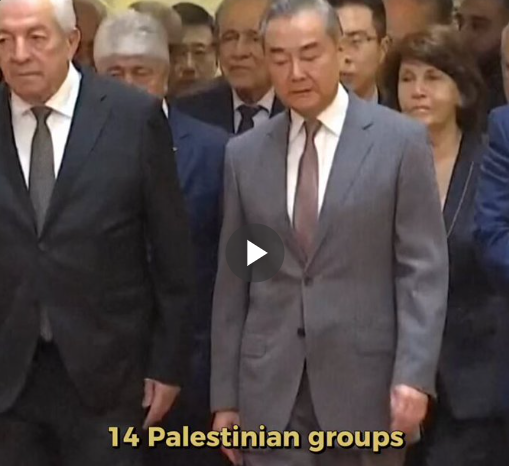The terrorists unite against Israel. They want to destroy Israel and the best path forward is the two-state solution, which will give these animals the chance to have a fully armed nation ready to pounce on Israel. It is only a matter of time if the terrorist supporting Palestinian Authority, which is backed by the United States and the United Nations, get their way. In other words, Israel is doomed short term and long term if President Trump is not elected.
Palestinian factions, including the long-feuding Hamas and Fatah, signed a unity government agreement in China, promising to govern the West Bank and Gaza Strip together following the end of the Israel-Hamas war. Announced in Beijing on Tuesday, the accord also involved 12 smaller Palestinian parties, marking a potentially historic step towards reconciliation between the two major political players in Palestinian territories.
Hamas, Fatah Agree To Unity Gov’t In China-Backed Deal pic.twitter.com/BOxYNAUJlY
— The Epoch Times (@EpochTimes) July 24, 2024
The agreement, however, offers only a vague framework for cooperation between Hamas and Fatah, who have been at odds since the late 1980s. Tensions reached a boiling point after the second Intifada ended in 2005, with Hamas narrowly winning the 2006 Palestinian legislative elections and taking control of Gaza in a violent coup the following year. This takeover resulted in a brutal crackdown on Fatah members, many of whom were arrested or killed. Since then, Hamas has maintained control over Gaza, while the Fatah-led Palestinian Authority governs parts of the Israeli-occupied West Bank. The Palestinian Authority, seen by many as corrupt and a collaborator with the Israeli occupation, has been criticized for suppressing dissent and arresting Hamas members wanted by Israel.
Despite previous reconciliation attempts, such as those in Cairo in 2011 and Algiers in 2022, the factions have failed to implement any agreements. The Beijing declaration calls for a Palestinian state based on pre-1967 borders, but it lacks specifics on the mechanics of governance and provides no timeline. Moreover, the deep-seated differences between Hamas and Fatah regarding Israel—Hamas’s refusal to recognize Israel and the Palestinian Authority’s support for a two-state solution—remain unaddressed.
PALESTINIAN FACTIONS AGREE TO FORM UNITY GOVERNMENT AFTER CHINA TALKS
14 Factions of Palestine unite in Beijing to sign a ‘National Unity’ agreement.
The agreement is a chance for all 14 Factions including the two rival groups Fatah and Hamas to unite in order to take control of… pic.twitter.com/QKFl1PfDa1— Islam Channel (@Islamchannel) July 23, 2024
Tahani Mustafa, an analyst with the Crisis Group, expressed skepticism about the Beijing agreement, suggesting it might be more of a public relations move than a substantive step toward reconciliation.
Israel swiftly denounced the agreement, with officials reiterating that Hamas would have no role in governing Gaza after the war. Prime Minister Benjamin Netanyahu also expressed reluctance to involve the Palestinian Authority in Gaza’s governance, citing security concerns.
China’s role as the broker of this agreement is significant, underscoring Beijing’s growing influence in Middle Eastern diplomacy. This move comes after China’s successful mediation between Saudi Arabia and Iran, signaling a broader strategy to increase its global diplomatic footprint.
14 PALESTINIAN GROUPS INCLUDING HAMAS & FATAH AGREE ON UNITY IN BEIJING, CHINA@MustafaBarghou1 analysis | @AJEnglish pic.twitter.com/OmRBsUooP1
— Filipe Neves

(@_FilipeNeves) July 23, 2024
The Beijing agreement’s impact remains uncertain, with many questioning whether the factions can turn their commitments into concrete actions. The complex political landscape and longstanding grievances suggest that the road to genuine unity and cooperation is fraught with challenges.
Iran knows that their forces in Lebanon and their terrorist forces in Gaza, combined with Iran and a new Palestinian State, will spell certain doom for the small Israeli nation. Especially if a Democrat regime is in power in the U.S.
Major Points:
- Hamas and Fatah, along with 12 smaller Palestinian factions, signed a unity government agreement in Beijing, aiming to govern the West Bank and Gaza Strip post-Israel-Hamas war.
- The two factions, long at odds since the late 1980s, have had previous failed reconciliation attempts, including agreements in Cairo and Algiers.
- The Beijing declaration lacks specific details on governance and provides no timeline for implementation, highlighting the factions’ differing stances on Israel.
- Israel has rejected the agreement, with Prime Minister Benjamin Netanyahu opposing any role for Hamas or the Palestinian Authority in Gaza’s future governance.
- China’s mediation in the agreement marks a significant step in its growing influence in Middle Eastern diplomacy, following its recent efforts to normalize ties between Saudi Arabia and Iran.
RM Tomi – Reprinted with permission of Whatfinger News



